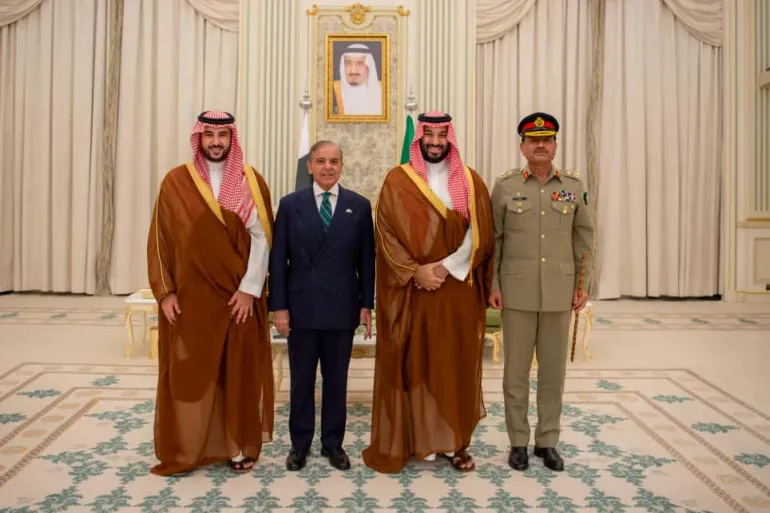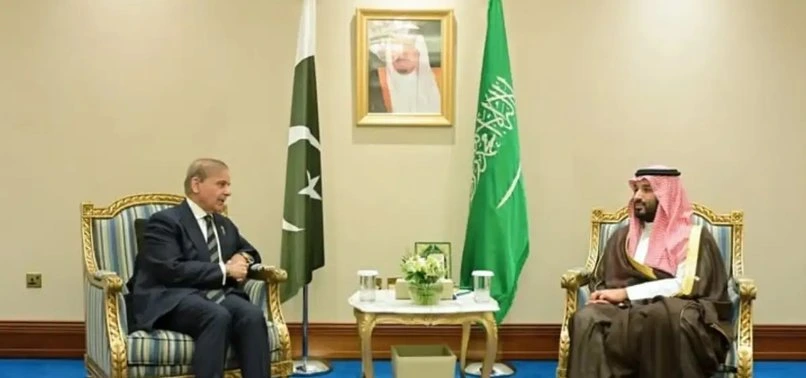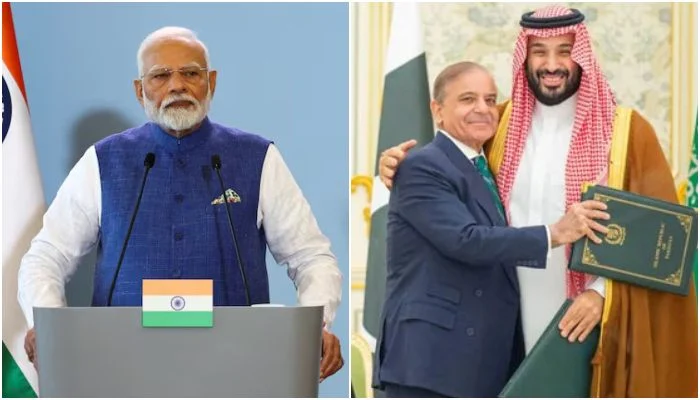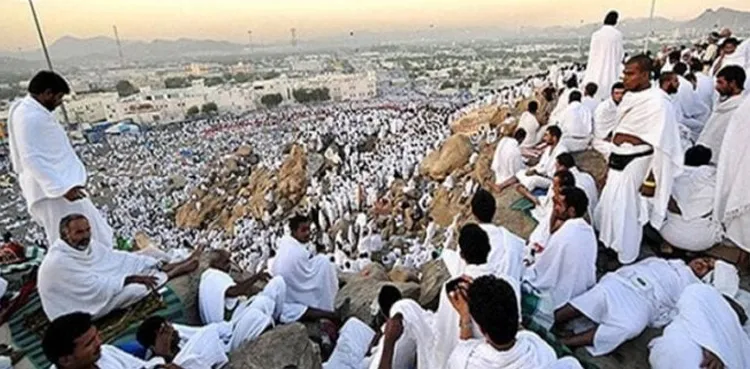Saudi Pakistan Defense Pact: Is It The Game-Changer for the Region?

Pakistan and Saudi Arabia signed a groundbreaking Saudi Pakistan defense pact on September 17, 2025, in Riyadh. This Strategic Mutual Defense Agreement represents the most significant upgrade in Pakistan Saudi Arabia defense relations in decades and fundamentally reshapes Middle East security dynamics.
What is the Strategic Mutual Defense Agreement?
The Strategic Mutual Defense Agreement was signed between Saudi Crown Prince Mohammed bin Salman and Pakistani Prime Minister Shehbaz Sharif at the Royal Court in Al-Yamamah Palace. Pakistan’s Army Chief Field Marshal Asim Munir witnessed the historic mutual defense agreement.
Key Agreement Details
| Aspect | Details |
| Agreement Name | Strategic Mutual Defense Agreement |
| Date Signed | September 17, 2025 |
| Location | Royal Court, Al-Yamamah Palace, Riyadh |
| Key Signatories | Crown Prince Mohammed bin Salman (Saudi Arabia), Prime Minister Shehbaz Sharif (Pakistan) |
| Core Principle | “Any aggression against either country treated as aggression against both” |
| Witness | Field Marshal Asim Munir (Pakistan Army Chief) |
The fundamental principle of this agreement is clear: “Any attack on either country will be treated as an attack on both.” This creates a formal bilateral defense cooperation between Pakistan and Saudi Arabia.
Key provisions of the defense agreement include:
- Enhanced joint military exercises and training programs
- Strengthened intelligence sharing mechanisms
- Coordinated defense industrial cooperation
- Commitment to regional deterrence against aggression
- Joint counterterrorism operations
Pakistan is the only nuclear-armed Muslim nation, while Saudi Arabia is one of the Middle East’s most influential kingdoms. Together, they now have a formalized strategic defense alliance.
Timing & Context: Israel’s Qatar Attack and Regional Security Concerns
The timing of this historic agreement is strategically significant. The pact comes just days after Israel’s unprecedented attack on Qatar’s capital, Doha, on September 9, 2025. The Israeli airstrike targeted Hamas political leadership during ceasefire negotiations, killing at least five Hamas members and one Qatari security official.
This attack on Qatar – which hosts the US Central Command forward headquarters and approximately 40,000-50,000 American troops across the Middle East – has fundamentally undermined Gulf states’ confidence in US security guarantees. The fact that Israel could strike a key US ally while American forces were stationed there exposed the limitations of relying solely on Washington for regional security.
The assault triggered an emergency Arab League and Organization of Islamic Cooperation (OIC) meeting, with Gulf Cooperation Council (GCC) states announcing activation of their joint defense mechanism. Against this backdrop of regional anxiety and declining US credibility, the agreement represents Gulf states seeking alternative security partnerships.
How the Defense Pact Reshapes Middle Eastern Geopolitics
This mutual defense agreement represents a seismic shift in Middle Eastern geopolitics, fundamentally altering the region’s security architecture in several key ways:

Major Geopolitical Transformations:
- Strategic Realignment: The pact signals Gulf states’ move away from exclusive reliance on US security guarantees toward diversified partnerships with regional powers. Saudi Arabia, long considered America’s most reliable Gulf ally, is now formally aligned with Pakistan’s military capabilities.
- Nuclear Deterrence Factor: While neither country has explicitly stated that Pakistan’s nuclear arsenal is covered under the agreement, analysts believe Saudi Arabia now enjoys a “de facto nuclear umbrella.” When asked whether the pact included nuclear weapons, a senior Saudi official stated: “This is a comprehensive defensive agreement that encompasses all military means.”
- Power Projection Capabilities: Pakistan, traditionally focused on South Asian security concerns, has now positioned itself as a Middle Eastern security provider. Former Pakistani ambassador Maleeha Lodhi noted, “Pakistan has taken up the role of a security provider, not just for Saudi Arabia but for the Middle East.”
- Complex Alliance Politics: The agreement creates new geopolitical complexities. Pakistan now risks entanglement in Saudi Arabia’s regional rivalries, particularly with Iran, while Saudi Arabia has committed itself to Pakistan’s disputes with India and potentially Afghanistan.
Regional Power Dynamics Comparison
| Country | Military Strength | Nuclear Status | Regional Influence |
| Pakistan | 600,000+ active personnel Nuclear weapons (165 warheads) | Nuclear armed since 1998 | South Asia, expanding to Middle East |
| Saudi Arabia | Advanced military technology Strong economic resources | Non-nuclear (NPT signatory) | Gulf states, Islamic world |
| Israel | Technologically advanced military Regional dominance | Undeclared nuclear program | Middle East hegemony |
| Iran | Large conventional forces Regional proxy networks | Nuclear program (weapons capability disputed) | Middle East influence operations |
Nuclear Implications and Strategic Deterrence
The nuclear dimension of this defense agreement has attracted significant international attention. Pakistan possesses an estimated 165 nuclear warheads and ballistic missiles capable of striking targets well beyond South Asia. While Pakistan’s stated nuclear doctrine focuses solely on deterring India, the pact raises questions about extended deterrence.
Former diplomat Hussain Haqani highlighted the significance of the agreement’s terminology: “Strategic Mutual Defense Agreement implies that it covers nuclear and missile defense. Pakistan has always used the term ‘strategic assets’ for its nuclear and missile programs.”
Pakistani Defense Minister Khawaja Asif made a significant statement, saying Pakistan’s capabilities will “absolutely” be available under the pact. However, he stressed the arrangement is “purely defensive” and designed to ensure joint security.
Some Gulf political analysts suggest that Pakistan’s nuclear arsenal could be viewed as part of a joint deterrence umbrella with Saudi Arabia, potentially altering the regional balance of power vis-à-vis Israel, the Middle East’s only acknowledged nuclear state.
However, security analyst Sahar Khan cautioned: “There is nothing in this agreement that indicates formation of a nuclear umbrella or any extended deterrence.”
Impact on India-Pakistan Relations and South Asian Security
The defense agreement carries significant implications for South Asian security dynamics. The pact comes just months after Pakistan and India fought a four-day military conflict in May 2025 – their most serious escalation in nearly three decades.

India’s Ministry of External Affairs spokesman Randhir Jaiswal stated that India would “study the implications of this development for our national security as well as for regional and global stability.” The timing is particularly sensitive for New Delhi, as it faces the prospect of Pakistan having formal Saudi backing at a moment of heightened bilateral tensions.
Analyst Asfandyar Mir from the Stimson Center observed: “At precisely the moment when Pakistan faces the threat of Indian military action, Pakistan has secured a strong collective defense agreement from Saudi Arabia. This introduces significant complexity to future India-Pakistan dynamics.”
The pact also represents a rebalancing of Pakistan-Saudi relations, which in recent years had been defined primarily by Saudi financial bailouts for Pakistan’s struggling economy while Riyadh simultaneously cultivated closer ties with India.
Regional Security Dynamics and US Credibility Crisis
The agreement reflects broader shifts in Middle Eastern security arrangements as Gulf states grow increasingly wary of US reliability. Despite hosting tens of thousands of American troops, Gulf monarchies have watched Washington remain unwavering in its support for Israel even as Tel Aviv strikes Arab territories.
This defense deal could serve as a template for similar bilateral defense cooperation between Pakistan and other Gulf states, including the UAE and Qatar. As one analyst noted, “As Gulf states seek to bolster their security, regional countries such as Pakistan, Egypt and Turkey emerge as natural partners.”
This shift represents what experts call the “diversification of Saudi Arabia’s security and defense policy” away from exclusive dependence on Western security guarantees toward regional partnerships.
What This Means for Umrah and Hajj Pilgrims
For the millions of Pakistani pilgrims who travel to Saudi Arabia annually for Umrah and Hajj, this strategic partnership signals enhanced bilateral cooperation that could benefit religious tourism.
The strengthened security partnership may lead to improved coordination in pilgrim safety measures and streamlined processes for religious travelers. With Pakistan now positioned as a key security partner, bilateral cooperation in managing the large influx of Pakistani pilgrims during Hajj season is likely to strengthen further.
The deeper diplomatic ties formalized through this strategic defense agreement could also facilitate smoother visa processing and enhanced services for Pakistani pilgrims visiting the holy cities of Mecca and Medina.
What International Experts Are Saying About the Agreement
International experts from around the world have analyzed this historic Saudi Pakistan defense pact, calling it a game-changing development:
US Security and Strategic Analysts:
Asfandyar Mir, Senior Fellow at Stimson Center (Washington DC): “Pakistan previously maintained mutual defense treaties with the United States during the Cold War, but they crumbled by the ’70s. Even with China, despite extensive defence cooperation, Pakistan lacks a formal mutual defence pact,” describing the agreement as a “watershed” moment for both countries.
Sahar Khan, Independent Security Analyst (Washington DC): “Pakistan already has a credibility problem in Washington, and this agreement won’t reduce it. It is in Pakistan’s interest to clarify that its nuclear and missiles programme is India-centric, and while its bilateral relations with Saudi Arabia remain strong, it will not fight Saudi wars but instead, will only provide relevant support.”
Edmund Fitton-Brown, Senior Fellow at Foundation for Defense of Democracies: “Though the Saudi-Pakistani relationship has long been close, there have been limitations on mutual support. This new mutual defense pact is likely to remain a symbolic agreement, with its main applicability in non-belligerent arenas, such as training and procurement.”
Middle East Military and Security Experts:
Dr. Mohammed Al-Qubaiban, Military Affairs Expert (Saudi Arabia): “Saudi Arabia boasts advanced technology and infrastructure and a traditional weapons arsenal. Pakistan, meanwhile, is a nuclear country that boasts a strong military. The agreement sends a message to allies, friends and others that Saudi Arabia has the freedom to choose these kinds of alliances.”
Dr. Hesham al-Ghannam, Director General of Security Research Center: The defense deal “reshapes the deterrence equation in the Middle East,” fundamentally changing regional security calculations.
Pakistani Strategic Defense Experts:
Maleeha Lodhi, Former Pakistani Ambassador to the US: “Pakistan has taken up the role of a security provider, not just for Saudi Arabia but for the Middle East,” noting this represents Pakistan’s transformation from a regional to an international security actor.
Defense Analyst Sohail Muhammad Ali: Called the pact a “historic development,” describing it as “the most significant defence pact in Pakistan’s history” and noting it “reflects international recognition of Pakistan’s defence capability.”
International Academic and Research Perspectives:
Muhammad Faisal, South Asia Security Researcher (University of Technology Sydney): “These events have exacerbated security anxieties of the Gulf states while jeopardising confidence in the US security umbrella as the ultimate shield. As Gulf states look to bolster their security, regional countries such as Pakistan, Egypt and Turkey emerge as natural partners.”
Rabia Akhtar, Nuclear Security Expert (Belfer Center): “The pact formalizes a deep alliance that has historical roots, rather than creating one out of thin air. It sends multiple messages: reassuring Saudi citizens that Pakistan ‘has the Kingdom’s back’ at a fraught time; warning Israel that Saudi Arabia is not isolated; and perhaps nudging the United States to take Gulf security concerns more seriously.”
Nuclear Proliferation and Strategic Deterrence Analysis:
Hussain Abdul-Hussain, Research Fellow at FDD: “Claims that Pakistan could provide Saudi Arabia with a nuclear umbrella are dubious, as its longest-range missile, the Shaheen III, has a 1,700-mile range and cannot reach most threats to the kingdom. Islamabad lacks the capability to project power over 2,600 miles to Riyadh.”
The consensus among international experts is that this agreement represents a major shift in regional security arrangements, though they differ on whether it constitutes genuine military transformation or primarily symbolic political signaling.
Future Implications and Strategic Consequences
The Strategic Mutual Defense Agreement represents more than a bilateral security arrangement – it signals a fundamental restructuring of Middle Eastern and South Asian security dynamics. As traditional alliances face new pressures and regional powers seek alternative partnerships, this agreement may serve as a model for future multilateral cooperation.
The pact’s success will depend on how both nations manage their exposure to each other’s regional tensions and geopolitical rivalries. For Pakistan, this means potential entanglement in Middle Eastern conflicts, while Saudi Arabia now has strategic stakes in South Asian security dynamics.
This defense agreement creates new possibilities and new risks. It marks a major shift away from traditional security arrangements toward more diverse regional partnerships. As both countries navigate this new relationship, the impact will be felt far beyond their borders.
As the region continues dealing with shifting geopolitical realities, the agreement stands as a testament to the evolving nature of international partnerships in an increasingly multipolar world. The pact not only strengthens bilateral ties between two key Muslim nations but also adds new variables to regional security that will influence Middle Eastern politics for years to come.
Key Takeaway: This historic Strategic Mutual Defense Agreement marks a new chapter in Pakistan-Saudi relations and regional security architecture, with strategic implications extending far beyond the two signatory countries.
Frequently Asked Questions
Does the agreement mean Pakistan will share nuclear weapons with Saudi Arabia?
This is the most debated aspect of the Strategic Mutual Defense Agreement. While neither country has explicitly confirmed nuclear sharing, Pakistani Defense Minister Khawaja Asif said Pakistan’s capabilities will “absolutely” be available under the pact. However, experts are divided – some believe Saudi Arabia now has a “de facto nuclear umbrella,” while others argue there’s no evidence of actual nuclear weapons sharing. Pakistan’s nuclear doctrine remains focused on India deterrence.
Will this mutual defense agreement force Pakistan into Middle East conflicts?
Not automatically. The pact states that “any aggression against either country shall be considered aggression against both,” but this doesn’t mean automatic military involvement. Pakistan refused to join Saudi Arabia’s Yemen intervention in 2015, showing it makes independent decisions. Both countries will likely evaluate each situation based on their national interests rather than automatically launching military responses.
How does the defense deal affect Saudi-US relations?
The timing suggests Saudi Arabia is diversifying security partnerships beyond just relying on the US. This comes after Israel’s attack on Qatar (a US ally) raised questions about American security guarantees. However, Saudi officials say this doesn’t replace their US relationship but adds another security layer. The US hasn’t officially responded to the agreement yet.
Will Pakistani troops be permanently stationed in Saudi Arabia under this agreement?
Pakistan already has 1,500-2,000 troops in Saudi Arabia in training and advisory roles – a relationship dating back to the 1960s. The new pact will likely expand this presence, but it formalizes existing military cooperation rather than creating something entirely new. The focus appears to be on joint training, military cooperation, and defense industrial collaboration.
What does the defense pact mean for India and regional stability?
India has said it will “study the implications” for its national security. The timing is sensitive since India and Pakistan fought a four-day conflict just months ago in May 2025. Some analysts believe this gives Pakistan stronger backing in its rivalry with India, while others argue it won’t change the fundamental India-Pakistan dynamic. Saudi Arabia emphasized it maintains strong relations with India and seeks regional peace.





